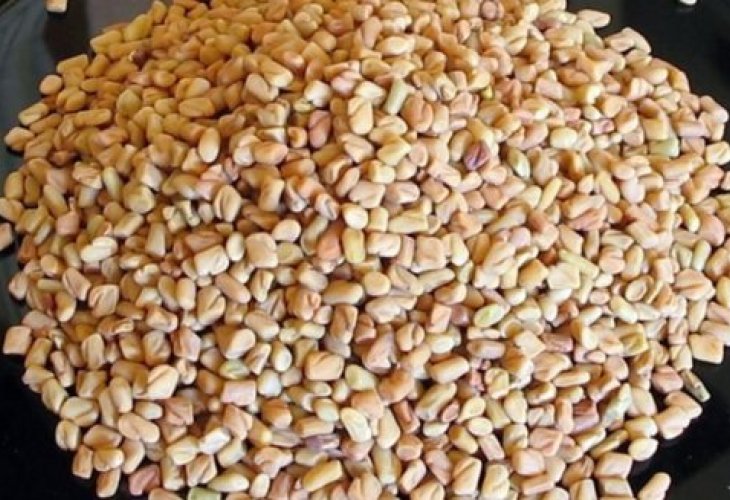Fenugreek: The Miracle Herb - 9 Health Benefits of Fenugreek Seeds
Fenugreek, scientifically known as Trigonella foenum-graecum, is more commonly associated with Yemeni cuisine. However, its remarkable benefits for various medical conditions, like strengthening hair, balancing blood sugar, alleviating women's pain, and more, have made it a natural wonder.
 Fenugreek | Fenugreek Benefits | Trigonella foenum-graecum
Fenugreek | Fenugreek Benefits | Trigonella foenum-graecumThe fenugreek (scientifically known as Trigonella foenum-graecum) is a plant more identified with Yemeni cuisine. However, due to its marvelous advantages and contributions to numerous medical problems, it is not unlikely to find it in Indian, Persian, Egyptian, Greek, Italian, and Asian kitchens as well. Because fenugreek contains essential components like proteins, dietary fibers, vitamin C, alkaloids, iron, and more - many nutritionists regard it as a true 'wizard,' and in the last decade, it has become a popular and sought-after product in health food stores in the USA and Europe.
So, what is everyone so excited about, and why are Yemenites unwilling to give up the traditional 'delicacy' with a velvety texture that accompanies almost every meal of theirs? Here are eight health benefits of the plant, including a nice video explaining how to use it:
1. Fenugreek contributes to hair strengthening, preventing hair loss and dandruff
Fenugreek seeds soaked in coconut oil overnight, applied as a mask on hair, and left for two to three hours - will work wonders for hair suffering from hair loss and dandruff, especially when this action is repeated for two consecutive weeks.
2. Balancing blood sugar levels
Fenugreek contains fibers known as galactomannan, which are extremely beneficial in slowing sugar absorption rates in the blood. Combining these fibers with the amino acid present in fenugreek also aids in insulin production. Therefore, individuals suffering from diabetes should consume fenugreek daily as part of their regular diet.
3. Fenugreek balances bad cholesterol levels (LDL)
Studies have shown that fenugreek excels in balancing bad cholesterol (known as LDL) levels in our bodies and sometimes even eliminating it entirely. In a recent study, participants who included around 60 grams of fenugreek in their daily diet reduced their cholesterol levels by 14% in a short time (about 24 weeks).
Want a winning, tasty, and healthy recipe with fenugreek? Watch
4. Alleviating labor pain during childbirth
Many doctors recommend pregnant women use fenugreek, but this should be done in the right dosage, as excessive consumption during pregnancy may cause irreversible harm to the fetus (and in some cases might even lead to miscarriage, G-d forbid). Fenugreek has also been proven particularly beneficial in reducing labor pains as it causes uterine contractions.
5. Balancing blood pressure and preventing heart diseases
The potassium found in fenugreek balances sodium levels in the body and directly affects the maintenance of a safe blood pressure level. Fenugreek also balances the heart and reduces the risk of various heart diseases.
6. Struggling with diets? Fenugreek has a solution for you
A comprehensive study on the contribution of fenugreek to appetite suppression and weight reduction found that fenugreek possesses amazing and extraordinary properties in this field too. Study participants were asked to consume a teaspoon of fenugreek seeds soaked in water every morning on an empty stomach. And the result? It surprised even the researchers. The fibers in fenugreek 'expanded' within the stomach, causing a long-lasting feeling of fullness (sometimes throughout the day). It should be noted that any such method (which causes massive appetite suppression) is generally not recommended, and a professional doctor should be consulted before any decision to undertake this method.
7. Fenugreek eases hot flashes, cramps, and women's pains
Diosgenin and isoflavone are compounds with properties that greatly aid in reducing pain during menstruation.
How to prepare fenugreek?
8. Increased milk production in nursing women
Fenugreek is renowned for its contribution to nursing women, as it contains a substance called diosgenin that increases milk supply.
9. Fenugreek assists in combating cancer cells
The previously mentioned diosgenin is found to have anti-cancer effects, recommended both for preventing the development of cancerous metastases in the body and reducing their harmful effects.
Additional content on fenugreek:
Is it permissible to prepare fenugreek on Shabbat? Click here for the answer here.
What are the health benefits of fenugreek, and what should one be cautious of when consuming it? Watch
Did you enjoy the article? Do you have good recipes with fenugreek? Tell us about it in the comments.

